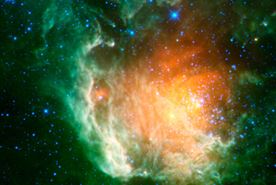Space: adjectives
Adjective
pertaining to the universe
NASA's Alpha Magnetic Spectrometer, designed to study antimatter and cosmic rays, is slated to launch into space with the shuttle Endeavour.
Adjective
relating to any region of outer space outside our solar system
NASA will fly the International Space Station until 2020. It will also begin developing a rocket for deep-space exploration, ventures that will include trips to asteroids and, eventually, Mars.
Adjective
in an early stage of development
Scientists are saying that Mars is still in an embryonic state, having remained unscathed from major, mass-building collisions.
Adjective
having a force of attraction between particles or bodies with mass or energy
Anything but empty space, a black hole is a great amount of matter packed into a very small area, resulting in a gravitational field so strong that nothing, not even light, can escape.
Adjective
capable of being lived on or in
Two outer planets of the Kepler 62 system may lie in the habitable zone. Their orbits place them both in the “Goldilocks” zone of lukewarm temperatures suitable for liquid water.
Adjective
too many to be counted
If you look to the stars tonight, consider this: No matter how innumerable they may seem, there are far more planets than stars lurking out there in the darkness.
Adjective
of or relating to the moon
US astronaut Neil Armstrong, the first man to set foot on the Moon, has died at age 82. He was commander of Apollo 11. More than 500 million TV viewers around the world watched its touchdown on the lunar surface.
Adjective
being born or beginning
US scientist Robin Canup has proposed that Saturn's rings, composed mostly of ice, may have formed when a large moon spiraled into the nascent planet.
Adjective
great in number, size, amount, extent, or degree
A new picture helps scientists unravel the mystery of a vast green blob discovered in a galaxy millions of light years away. Part of a streamer of gas stretching around the galaxy, it may be giving birth to new stars.
Adjective
state of being twisted or bent out of shape
NASA's Hubble Space Telescope has captured an image of an unusual edge-on galaxy, revealing remarkable details of its warped dusty disk.









